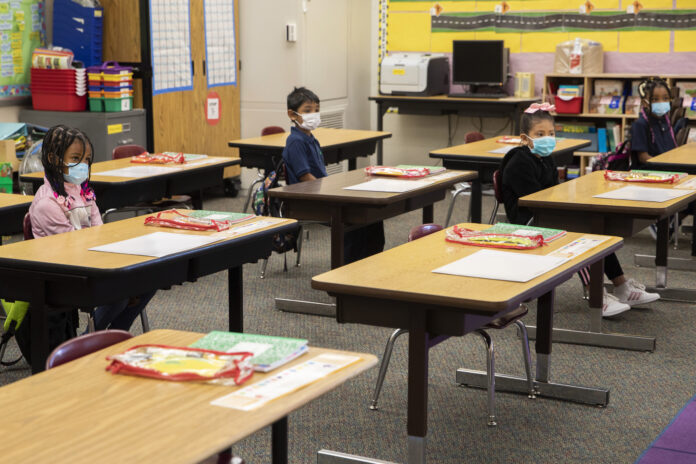
By Adam Beam, Associated Press
California announced new coronavirus rules for public schools on Monday that let students and teachers sit as close to each other as they want while making sure no one will miss class time even if they are exposed to someone with the virus.
But those changes from the last school year were overshadowed by news the state would continue to require all students and staff to wear masks while indoors, reigniting criticism of Gov. Gavin Newsom as he faces a recall election in September.
The federal government last week said teachers and students who are fully vaccinated against the coronavirus don’t have to wear masks indoors. But that guidance, published by the Centers for Disease Control and Prevention, also recommended students and staff stay at least 3 feet (0.9 meters) apart to reduce the spread of a disease that is primarily transmitted through the air.
Elsewhere in the U.S., schools and state officials have adopted a patchwork of rules for students and teachers. Some states, including Rhode Island, have done away with mask mandates for schools. Others are leaving the decision to districts. Illinois health officials say they’re fully adopting the CDC’s guidelines.
In California, state officials said they worried that imposing social distancing would make it harder for some schools to accommodate all students who return to classrooms. So, they made a choice: The state will not require physical distancing in exchange for everyone wearing a mask.
“Masks best promote both safety and in-person learning by reducing the need for physical distancing,” the new rules state.
State officials promised to review these rules, and possibly change them, by Nov. 1.
Newsom faced heavy criticism for not moving more quickly to return students to classrooms during the last school year. Many districts, including Los Angeles with more than 550,000 K-12 students, only instituted part-time, in-person instruction for the final weeks of the semester. Since then, Newsom has advocated for students to return to full-time, in-person instruction.
The new rules angered parents who say the mask requirement will continue to stress children who already saw two school years upended by remote learning and missed milestones like proms, sports, concerts and graduations.
“It’s outrageous,” said Jonathan Zachreson, a father of three students and founder of the group Reopen California Schools. “We’re continuing to put the burden of this pandemic on our children, and it needs to stop.”
The mask requirement actually became public Friday, and during the weekend Zacherson said his group received more than $15,000 in donations to fund a lawsuit against the state. Overall, Zachreson said the group has more than $65,000 to prepare the lawsuit, which he said will be filed in coming weeks.
“Newsom had one last opportunity to show that he could put children first with these school reopening guidelines, and he blew it,” added Zachreson, who said he voted for Newsom in 2018 but plans to vote to recall him in the Sept. 14th election.
Dr. Monica Gandhi, an infectious disease doctor and professor of medicine at the University of California-San Francisco, had said public schools should reconsider masking requirements once hospitalization rates fall below five per 100,000 people in a community and at least two-thirds of adults have received at least one dose of the COVID-19 vaccine.
While those thresholds have been met in some parts of California, Gandhi called the state’s new rules “reasonable.” She said eliminating the physical distancing requirement “is one of the best things California can do” to get children back in classrooms.
Masking children, she said, “is probably one of the most gray areas that we have” because there is so little data about children.
“In these gray areas there is always going to be controversy,” she said. “We’ve just got to get the kids back and then we can sort out those kinds of details.”
Dr. Jeffrey Klausner, clinical professor of population and public health sciences at the University of Southern California, said the rules “go too far” and are not based on local data.
“I think they’d have better trust and credibility with Californians if they were a little more nuanced and smarter about it,” he said. “I think that’s frustrating, in a state of 40 million people, just to say everyone has to be the same.”
California’s new rules initially said if students refused to wear a mask, schools should send them home. But in a tweet posted Monday evening, the department said it would leave enforcement decisions up to local school districts.
If students are exposed to someone at school who has the coronavirus — and everyone was wearing masks at the time — the exposed students do not have to miss class to quarantine, under these conditions: They don’t have symptoms, they continue to wear a mask indoors, they are tested at least twice per week for 10 days, and they don’t participate in sports or other extracurricular activities during that period.
The state also encourages physical distancing while students are eating, asking schools to have students eat outside as much as possible.


